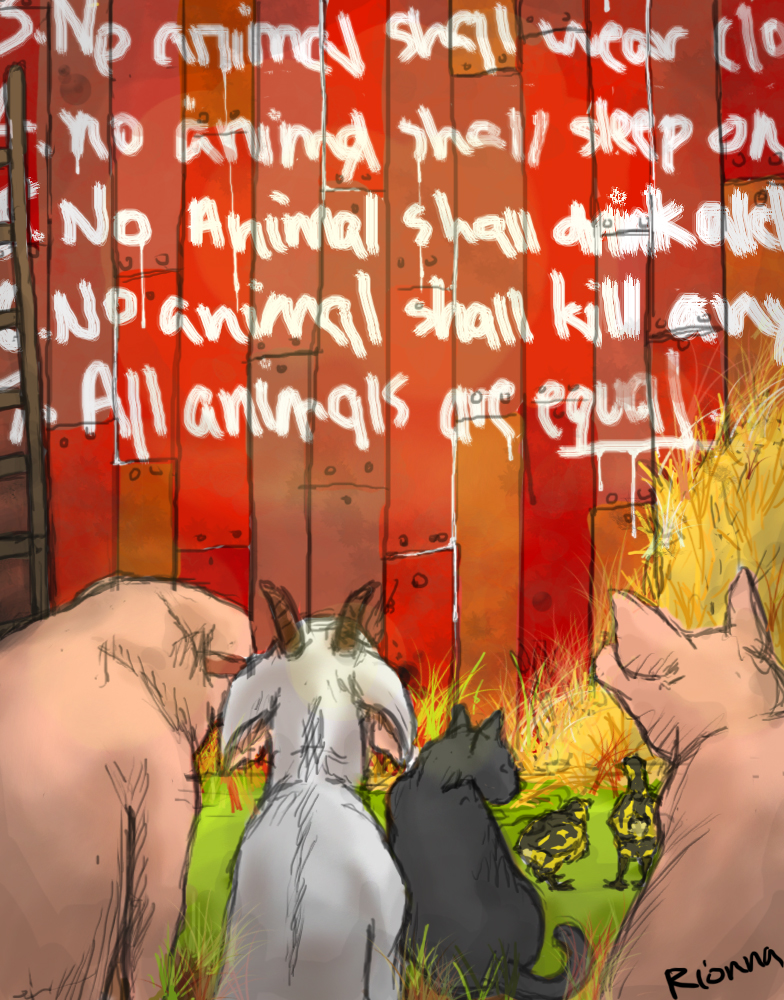
George Orwell’s Animal Farm turned 70 years old last week. The story of farm animals overthrowing human oppression and ruling themselves is the classic political fable of the 20th century.
In this allegory on the brutal totalitarian regime of Stalinism, Napoleon the pig is Stalin and Snowball is Trotsky, who fled abroad to escape his secret police. Orwell was a fierce critic of the Soviet Union, having fought in the Spanish Civil War and experienced Communist repression of anarchists and Trotskyists there, which he wrote about in Homage to Catalonia. He was also enormously impressed with those areas run by anarchists:
“Yet so far as one could judge the people were contented and hopeful. There was no unemployment, and the price of living was still extremely low; you saw very few conspicuously destitute people, and no beggars except the gypsies. Above all, there was a belief in the revolution and the future, a feeling of having suddenly emerged into an era of equality and freedom. Human beings were trying to behave as human beings and not as cogs in the capitalist machine.”
Though not himself anarchist, Orwell belonged to the tradition of English libertarian socialism which includes the likes of The Levellers, William Blake and William Morris. According to his biographer Bernard Crick, “he became the living embodiment of that old English socialism that was not anti-parliamentary but was always suspicious of what power – or the pursuit of it – could do to people whom he described as ‘the backstairs crawlers and the arse-lickers of the Parliamentary Labour Party’.”
Due to his sometimes contradictory and difficult to pin down views, Orwell has at times been popular with the right. Animal Farm and 1984 were used as warnings that revolutions would inevitably fail. As a staunch believer in freedom, equality and what he called “common decency”, he would have railed against this and the neoliberalism of the last 40 years.
Orwell was a paid up member of the awkward squad who delighted in pissing off authority and upsetting cherished beliefs, even those held by people who were “comrades”. He castigated socialist intellectuals, especially pacifists and supporters of the Soviet Union, as sandal-wearing vegetarian ascetics, out of touch with ordinary people. Yet he also cared about animal suffering, writing an essay described as “moral writing of great stature” called Shooting an Elephant.
Animal Farm itself had its origin in cruelty. Inspired by watching a young boy whipping a carthorse whenever it tried to turn, Orwell wrote: “It struck me that if only such animals became aware of their strength we should have no power over them, and that men exploit animals in much the same way as the rich exploit the proletariat.”.
For animal rights campaigners today, the speech given by old Major “the prize Middle White boar”at the beginning of the novel would carry real weight. In fact a lot of it reads like an incitement to veganism:
Man is the only creature that consumes without producing. He does not give milk, he does not lay eggs, he is too weak to pull the plough, he cannot run fast enough to catch rabbits. Yet he is lord of all the animals. He sets them to work, he gives back to them the bare minimum that will prevent them from starving, and the rest he keeps for himself. Our labour tills the soil, our dung fertilises it, and yet there is not one of us that owns more than his bare skin. You cows that I see before me, how many thousands of gallons of milk have you given during this last year? And what has happened to that milk which should have been breeding up sturdy calves? Every drop of it has gone down the throats of our enemies. And you hens, how many eggs have you laid in this last year, and how many of those eggs ever hatched into chickens? The rest have all gone to market to bring in money for Jones and his men. And you, Clover, where are those four foals you bore, who should have been the support and pleasure of your old age? Each was sold at a year old–you will never see one of them again. In return for your four confinements and all your labour in the fields, what have you ever had except your bare rations and a stall.
There is a side of Orwell rarely acknowledged nowadays. He was no vegan yet he clearly sympathises with the plight of animals. Their exploitation by humans is frequently mentioned in Animal farm, even as the pigs betray the revolution which has overthrown Farmer Jones and brought about the seven commandments of animalism, amending “All animals are equal” into “All animals are equal but some animals are more equal than others”
As the story reaches its climax, the pigs themselves become increasingly human, adopting the practices of Jones by living in his house, using his Crown Derby dinner service, walking on two legs and finally even inviting neighbouring farmers to dinner. One of them, Mr Pilkington, says: “If you have your lower animals to contend with…we have our lower classes”.
The very last sentence of the book, perhaps the most startling in English literature, sums it up: “The creatures outside looked from pig to man, and from man to pig, and from pig to man again; but already it was impossible to say which was which.”
In the unlikely event you haven’t read Animal Farm, or you want to re-read it, it’s here: http://www.george-orwell.org/Animal_Farm/0.html
BBC Radio adaptation: http://www.bbc.co.uk/programmes/b00c1y40
Quotes from Orwell on anarchism: https://www.reddit.com/r/Anarchism/comments/1q7duh/orwell_on_anarchism/